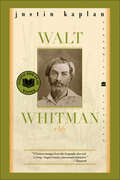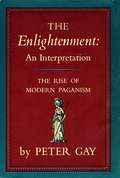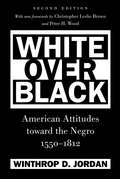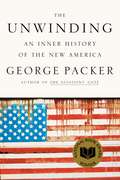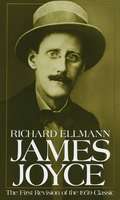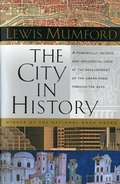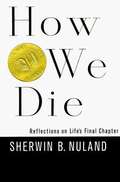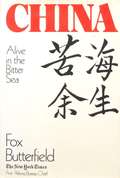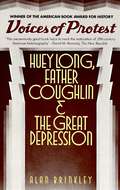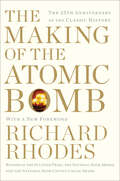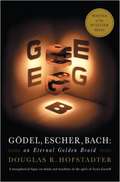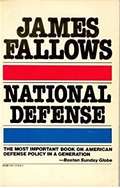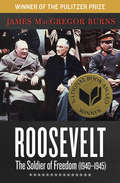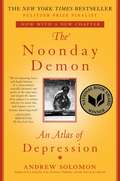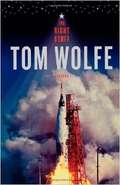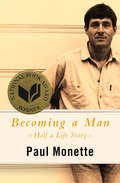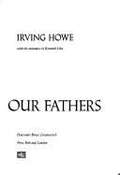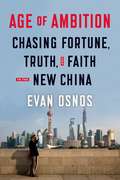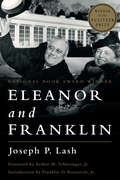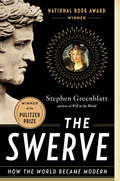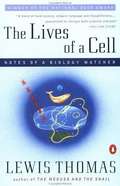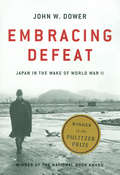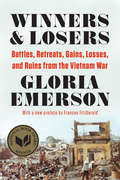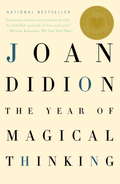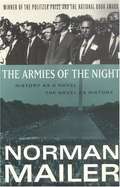Special Collections
National Book Award Winners - Non-Fiction
- Table View
- List View
Walt Whitman
by Justin KaplanThe Pulitzer Prize and National Book Award-winning author “gives us flesh and blood Whitman in this fine and sensitive biography” (The Boston Globe).A moving, penetrating, sharply focused portrait of America’s greatest poet—his genius, his passions, his androgynous sensibility—an exuberant life entwined with the turbulent history of mid-nineteenth century America. In vivid detail, Justin Kaplan, winner of the Pulitzer Prize and the National Book Award, examines the mysterious selves of this enigmatic man whose bold voice of joy and sexual liberation embraced a growing nation . . . and exposes the quintessential Whitman, that perfect poet whose astonishing verse made “words sing, dance, kiss, copulate” for an entire world to hear.“Whitman emerges from this biography alive and kicking—hugely human, enormously attractive.” —Newsweek“Not only readable, but dramatic.” —The New York Times Book Review“A buoyant, energizing book.” —The Nation“Brilliant.” —Publishers Weekly
The Enlightenment
by Peter GayThe eighteenth-century Enlightenment marks the beginning of the modern age, when the scientific method and belief in reason and progress came to hold sway over the Western world. In the twentieth century, however, the Enlightenment has often been judged harshly for its apparently simplistic optimism. Now a master historian goes back to the sources to give a fully rounded account of its true accomplishments.
Winner of the National Book Award
White Over Black
by Winthrop D. Jordan and Christopher Leslie Brown and Peter H. WoodIn 1968, Winthrop D. Jordan set out in encyclopedic detail the evolution of white Englishmen's and Anglo-Americans' perceptions of blacks, perceptions of difference used to justify race-based slavery, and liberty and justice for whites only. This second edition, with new forewords by historians Christopher Leslie Brown and Peter H. Wood, reminds us that Jordan's text is still the definitive work on the history of race in America in the colonial era. Every book published to this day on slavery and racism builds upon his work; all are judged in comparison to it; none has surpassed it.
National Book Award Winner
The Unwinding
by George PackerA riveting examination of a nation in crisis, from one of the finest political journalists of our generation.
American democracy is beset by a sense of crisis. Seismic shifts during a single generation have created a country of winners and losers, allowing unprecedented freedom while rending the social contract, driving the political system to the verge of breakdown, and setting citizens adrift to find new paths forward. In The Unwinding, George Packer, author of The Assassins' Gate: America in Iraq, tells the story of the United States over the past three decades in an utterly original way, with his characteristically sharp eye for detail and gift for weaving together complex narratives.
The Unwinding journeys through the lives of several Americans, including Dean Price, the son of tobacco farmers, who becomes an evangelist for a new economy in the rural South; Tammy Thomas, a factory worker in the Rust Belt trying to survive the collapse of her city; Jeff Connaughton, a Washington insider oscillating between political idealism and the lure of organized money; and Peter Thiel, a Silicon Valley billionaire who questions the Internet's significance and arrives at a radical vision of the future. Packer interweaves these intimate stories with biographical sketches of the era's leading public figures, from Newt Gingrich to Jay-Z, and collages made from newspaper headlines, advertising slogans, and song lyrics that capture the flow of events and their undercurrents.
The Unwinding portrays a superpower in danger of coming apart at the seams, its elites no longer elite, its institutions no longer working, its ordinary people left to improvise their own schemes for success and salvation. Packer's novelistic and kaleidoscopic history of the new America is his most ambitious work to date.
National Book Award 2013
James Joyce
by Richard EllmannBiography of the Irish author. Listed #73 on Modern Library's top 100 nonfiction books of the century.
Winner of the National Book Award
The City in History
by Lewis MumfordThe city's development from ancient times to the modern age. Winner of the National Book Award. "One of the major works of scholarship of the twentieth century" (Christian Science Monitor). Index; illustrations.
Winner of the National Book Award
How We Die
by Sherwin B. NulandAttempting to demythologize the process of dying, Nuland explores how we shall die, each of us in a way that will be unique. Through particular stories of dying--of patients, and of his own family--he examines the seven most common roads to death: old age, cancer, AIDS, Alzheimer's, accidents, heart disease, and strokes, revealing the facets of death's multiplicity. "It's impossible to read How We Die without realizing how earnestly we have avoided this most unavoidable of subjects, how we have protected ourselves by building a cultural wall of myths and lies. I don't know of any writer or scientist who has shown us the face of death as clearly, honestly and compassionately as Sherwin Nuland does here."--James Gleick.
*** Originally published in 1994 and on the New York Times bestseller list for weeks, this reprint includes an in-depth 2010 post-epilogue epilogue by the author.
Winner of the National Book Award
China
by Fox ButterfieldIn 1979 Fox Butterfield became the first New York Times correspondent in China in 30 years. He wrote this book about his experiences during the two years he was a correspondent there.
Winner of the National Book Award
Voices of Protest
by Alan BrinkleyThis is a book about two remarkable men--Huey P. Long, a first-term United States Senator from the red-clay, piney-woods country of northern Louisiana; and Charles E. Coughlin, a Catholic priest from an industrial suburb near Detroit. From modest origins, they rose together in the early years of the Great Depression to become the two most successful leaders of national political dissidence of their era.
Winner of the National Book Award
The Making of the Atomic Bomb
by Richard Rhodes**Winner of the Pulitzer Prize, the National Book Award, and the National Book Critics Circle Award** The definitive history of nuclear weapons—from the turn-of-the-century discovery of nuclear energy to J. Robert Oppenheimer and the Manhattan Project—this epic work details the science, the people, and the sociopolitical realities that led to the development of the atomic bomb.This sweeping account begins in the 19th century, with the discovery of nuclear fission, and continues to World War Two and the Americans’ race to beat Hitler’s Nazis. That competition launched the Manhattan Project and the nearly overnight construction of a vast military-industrial complex that culminated in the fateful dropping of the first bombs on Hiroshima and Nagasaki.Reading like a character-driven suspense novel, the book introduces the players in this saga of physics, politics, and human psychology—from FDR and Einstein to the visionary scientists who pioneered quantum theory and the application of thermonuclear fission, including Planck, Szilard, Bohr, Oppenheimer, Fermi, Teller, Meitner, von Neumann, and Lawrence. From nuclear power’s earliest foreshadowing in the work of H.G. Wells to the bright glare of Trinity at Alamogordo and the arms race of the Cold War, this dread invention forever changed the course of human history, and The Making of The Atomic Bomb provides a panoramic backdrop for that story. Richard Rhodes’s ability to craft compelling biographical portraits is matched only by his rigorous scholarship. Told in rich human, political, and scientific detail that any reader can follow, The Making of the Atomic Bomb is a thought-provoking and masterful work.
Gödel, Escher, Bach
by Douglas R. HofstadterThis groundbreaking Pulitzer Prize-winning book sets the standard for interdisciplinary writing, exploring the patterns and symbols in the thinking of mathematician Kurt Gödel, artist M.C. Escher, and composer Johann Sebastian Bach.
Winner of the National Book Award
Pulitzer Prize Winner
National Defense
by James FallowsTHIS BOOK is designed to give the general reader better ways of thinking about defense. In the first few years of the 1980s, the United States will have to make choices of enormous consequence about the size, purpose, and composition of its military force. These include whether to restore the draft, build new nuclear missiles and bombers, enlarge the Navy, equip a "rapid deployment force" for intervention overseas.
Winner of the National Book Award
Roosevelt
by James MacGregor BurnsThe &“engrossing&” Pulitzer Prize and National Book Award–winning history of FDR&’s final years (Barbara Tuchman). The second entry in James Macgregor Burns&’s definitive two-volume biography of Franklin Delano Roosevelt begins with the president&’s precedent-breaking third term election in 1940, just as Americans were beginning to face the likelihood of war. Here, Burns examines Roosevelt&’s skillful wartime leadership as well as his vision for post-war peace. Hailed by William Shirer as &“the definitive book on Roosevelt in the war years,&” and by bestselling author Barbara Tuchman as &“engrossing, informative, endlessly readable,&” The Soldier of Freedom is a moving profile of a leader gifted with rare political talent in an era of extraordinary challenges, sacrifices, heroism, and hardship.
The Noonday Demon
by Andrew SolomonWith uncommon humanity, candor, wit, and erudition, award-winning author Andrew Solomon takes the reader on a journey of incomparable range and resonance into the most pervasive of family secrets. His contribution to our understanding not only of mental illness but also of the human condition is truly stunning.
The Noonday Demon examines depression in personal, cultural, and scientific terms. Drawing on his own struggles with the illness and interviews with fellow sufferers, doctors and scientists, policymakers and politicians, drug designers and philosophers, Solomon reveals the subtle complexities and sheer agony of the disease. He confronts the challenge of defining the illness and describes the vast range of available medications, the efficacy of alternative treatments, and the impact the malady has had on various demographic populations around the world and throughout history. He also explores the thorny patch of moral and ethical questions posed by emerging biological explanations for mental illness.
The depth of human experience Solomon chronicles, the range of his intelligence, and his boundless curiosity and compassion will change the reader's view of the world.
The Right Stuff
by Tom WolfeThe Right Stuff is Tom Wolfe's deft account of a cast of heroes, introduced to America with the explosion of space exploration in the romantic heyday of the 20th century and encapsulated in Neal Armstrong's "one giant step for mankind."
Beginning with the first experiments with manned space flight in the 1940s, remembering the feats of Chuck Yeager and the breaking of the sound barrier, and focusing in on the brave pilots of the Mercury Project, Wolfe's ability to marry historical fact with dramatic intensity is nowhere more evident than in The Right Stuff.
Winner of the National Book Award
Becoming a Man
by Paul MonetteThe National Book Award–winning coming-out memoir. &“One of the most complex, moral, personal, and political books to have been written about gay life&” (LA Weekly). Paul Monette grew up all-American, Catholic, overachieving . . . and closeted. As a child of the 1950s, a time when a kid suspected of being a &“homo&” would routinely be beaten up, Monette kept his secret throughout his adolescence. He wrestled with his sexuality for the first thirty years of his life, priding himself on his ability to &“pass&” for straight. The story of his journey to adulthood and to self-acceptance with grace and honesty, this intimate portrait of a young man&’s struggle with his own desires is witty, humorous, and deeply felt. Before his death of complications from AIDS in 1995, Monette was an outspoken activist crusading for gay rights. Becoming a Man shows his courageous path to stand up for his own right to love and be loved. This ebook features an illustrated biography of Paul Monette including rare images and never-before-seen documents from the Paul Monette papers of the UCLA Library Special Collections.
World of Our Fathers
by Irving HoweThis book tells the story of those east European Jews who, for several decades starting in the 1880's, undertook a massive migration to the United States. There were two million of them, and they settled mostly in the large American cities, where they attempted to maintain their own Yiddish culture; then, as a result of both external pressures and their own desires, they made their way into American society.
Winner of the National Book Award
Age of Ambition
by Evan OsnosWinner of the 2014 National Book Award in nonfiction. An Economist Best Book of 2014. A vibrant, colorful, and revelatory inner history of China during a moment of profound transformation From abroad, we often see China as a caricature: a nation of pragmatic plutocrats and ruthlessly dedicated students destined to rule the global economy-or an addled Goliath, riddled with corruption and on the edge of stagnation. What we don't see is how both powerful and ordinary people are remaking their lives as their country dramatically changes As the Beijing correspondent for The New Yorker, Evan Osnos was on the ground in China for years, witness to profound political, economic, and cultural upheaval. In Age of Ambition, he describes the greatest collision taking place in that country: the clash between the rise of the individual and the Communist Party's struggle to retain control. He asks probing questions: Why does a government with more success lifting people from poverty than any civilization in history choose to put strict restraints on freedom of expression? Why do millions of young Chinese professionals-fluent in English and devoted to Western pop culture-consider themselves "angry youth," dedicated to resisting the West's influence? How are Chinese from all strata finding meaning after two decades of the relentless pursuit of wealth? Writing with great narrative verve and a keen sense of irony, Osnos follows the moving stories of everyday people and reveals life in the new China to be a battleground between aspiration and authoritarianism, in which only one can prevail.
Eleanor and Franklin
by Joseph P. LashIn his extraordinary biography of the major political couple of the twentieth century, Joseph P. Lash reconstructs from Eleanor Roosevelt's personal papers her early life and four-decade marriage to the four-time president who brought America back from the Great Depression and helped to win World War II. The result is an intimate look at the vibrant private and public worlds of two incomparable people.
Winner of the Pulitzer Prize
Winner of the National Book Award
The Swerve
by Stephen GreenblattWinner of the Pulitzer Prize for Nonfiction • Winner of the National Book Award • New York Times Bestseller Renowned scholar Stephen Greenblatt brings the past to vivid life in what is at once a supreme work of scholarship, a literary page-turner, and a thrilling testament to the power of the written word. In the winter of 1417, a short, genial, cannily alert man in his late thirties plucked a very old manuscript off a dusty shelf in a remote monastery, saw with excitement what he had discovered, and ordered that it be copied. He was Poggio Bracciolini, the greatest book hunter of the Renaissance. His discovery, Lucretius’ ancient poem On the Nature of Things, had been almost entirely lost to history for more than a thousand years. It was a beautiful poem of the most dangerous ideas: that the universe functions without the aid of gods, that religious fear is damaging to human life, that pleasure and virtue are not opposites but intertwined, and that matter is made up of very small material particles in eternal motion, randomly colliding and swerving in new directions. Its return to circulation changed the course of history. The poem’s vision would shape the thought of Galileo and Freud, Darwin and Einstein, and—in the hands of Thomas Jefferson—leave its trace on the Declaration of Independence. From the gardens of the ancient philosophers to the dark chambers of monastic scriptoria during the Middle Ages to the cynical, competitive court of a corrupt and dangerous pope, Greenblatt brings Poggio’s search and discovery to life in a way that deepens our understanding of the world we live in now. “An intellectually invigorating, nonfiction version of a Dan Brown–like mystery-in-the-archives thriller.” —Boston Globe
Lives of a Cell
by Lewis ThomasElegant, suggestive, and clarifying, Lewis Thomas's profoundly humane vision explores the world around us and examines the complex interdependence of all things. Extending beyond the usual limitations of biological science and into a vast and wondrous world of hidden relationships, this provocative book explores in personal, poetic essays to topics such as computers, germs, language, music, death, insects, and medicine. Lewis Thomas writes, "Once you have become permanently startled, as I am, by the realization that we are a social species, you tend to keep an eye out for the pieces of evidence that this is, by and large, good for us."
Winner of the National Book Award
Embracing Defeat
by John W. DowerDrawing on a vast range of Japanese sources and illustrated with dozens of astonishing documentary photographs, Embracing Defeat is the fullest and most important history of the more than six years of American occupation, which affected every level of Japanese society, often in ways neither side could anticipate. Dower, whom Stephen E. Ambrose has called "America's foremost historian of the Second World War in the Pacific," gives us the rich and turbulent interplay between West and East, the victor and the vanquished, in a way never before attempted, from top-level manipulations concerning the fate of Emperor Hirohito to the hopes and fears of men and women in every walk of life. Already regarded as the benchmark in its field, Embracing Defeat is a work of colossal scholarship and history of the very first order. John W. Dower is the Elting E. Morison Professor of History at the Massachusetts Institute of Technology. He is a winner of the National Book Critics Circle Award for War Without Mercy.
Winner of the National Book Award.
Pulitzer Prize Winner
Winners & Losers
by Frances Fitzgerald and Gloria EmersonThe National Book Award-winning classic on the Vietnam War, reissued for the war's fiftieth anniversary. Based on interviews with both Americans and Vietnamese, Winners and Losers is Gloria Emerson's powerful portrait of the Vietnam War. From soldiers on the battlefield to protesters on the home front, Emerson chronicles the war's impact on ordinary lives with characteristic insight and brilliance. Today, as we approach the fiftieth anniversary of the Gulf of Tonkin incident, much of the physical and emotional damage from that conflict--the empty political rhetoric, the mounting casualties, and the troubled homecomings of shell-shocked soldiers--is once again part of the American experience. Winners and Losers remains a potent reminder of the danger of blindly applied American power, and its poignant truths are the legacy of a remarkable journalist.
The Year of Magical Thinking
by Joan DidionJoan Didion explores an intensely personal yet universal experience: several days before Christmas 2003, John Gregory Dunne and Joan Didion saw their only daughter, Quintana, fall ill with what seemed at first flu, then pneumonia, then complete septic shock. She was put into an induced coma and placed on life support. Days later, the night before New Year's Eve, the Dunnes were just sitting down to dinner after visiting the hospital when John Gregory Dunne suffered a massive and fatal coronary. In a second, this close, symbiotic partnership of forty years was over. Four weeks later, their daughter pulled through. Two months after that, arriving at LAX, she collapsed and underwent six hours of brain surgery at UCLA Medical Center to relieve a massive hematoma.
This powerful book is Didion's attempt to make sense of the weeks and then months that cut loose any fixed idea she ever had about death, about illness, about marriage and children and memory, about the shallowness of sanity, about life itself.
Winner of the National Book Award
The Armies of the Night
by Norman MailerOctober 21, 1967. Washington DC. Protesters are marching to end the war in Vietnam, Mailer among them. From his perception of the day comes a work that shatters traditional reportage.
Winner of the Pulitzer Prize.
Winner of the National Book Award
